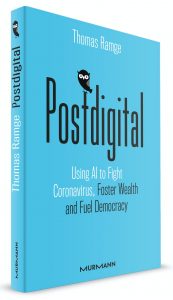 We are honoured to present to you an exclusive excerpt from digital thought leader and bestselling author Thomas Ramge’s new book Postdigital. Using AI to Fight Coronavirus, Foster Wealth and Fuel Democracy:
We are honoured to present to you an exclusive excerpt from digital thought leader and bestselling author Thomas Ramge’s new book Postdigital. Using AI to Fight Coronavirus, Foster Wealth and Fuel Democracy:
In concrete terms, what would a postdigital world look like in which people — both individually and as a society — used digital technologies sovereignly? With respect to the four primary areas of the techlash critique, a scenario for the future is emerging.
- We’ll only reach for our smartphones when there’s a reason and not because each new reflexive use creates new reasons for the next ritualistic unlocking of the home screen.
- Companies will no longer digitalize their production, internal processes and communications because digitalization is the first commandment of management at the moment, but instead rigorously test each step in the digitalization process against the most important criterion of value creation: What would this change really add to the bottom line? Sham innovations that in truth only complicate things — essential things like production, internal processes and communications — will be eliminated. Intelligent regulation will ensure that competition returns to digital markets and the superprofitable superstar firms will finally pay their fair share of taxes. That would help pay for the public infrastructure that the digital superstars also use in their highly profitable business models. If necessary, some essential digital services would be regulated much like water companies, natural gas suppliers and other basic utilities are today. At least the left wing of the Democratic Party is having similar thoughts, as exemplified by Elizabeth Warren and Bernie Sanders.
- Democratic discourse needs moderation online and offline. The value of opinion in discussion is significantly lower than commonly supposed by those who constantly give their own. Never fear, there will continue to be unmoderated discussion forums. PewDiePie will still have unfettered opportunity to riff on social topics (in between game play videos) on YouTube. But in the postdigital age, essential political debates will take place on discussion platforms where the discourse is serious, fact-based and nuanced, using real names and with pauses built in for reflection instead of a mad rush to respond. The fact check would be an inherent and accepted part of this culture of digital discussion. Truth would be negotiated via some kind of Super-Wikipedia. Even the powerful would express themselves on these platforms instead of through media rooted in visceral emotion like Twitter, or media designed for aesthetic self-promotion like Instagram. Perhaps software and platforms such as “Liquid Democracy” would come into use to enable new forms of direct, grass-roots decision making, especially at the local level. In the meantime, government and public administration will have learned to improve through digital technology.
Technology is never good or bad. It depends on what we use it for. This statement, constantly repeated by tech-fixated idealists, is […] naive. Technology is usually developed for a specific purpose in a socio-technical context.
- Technology is never good or bad. It depends on what we use it for. This statement, constantly repeated by tech-fixated idealists, is on the one hand naive. Technology is usually developed for a specific purpose in a socio-technical context. It’s more suitable for this purpose than for others, and therefore it’s not neutral. On the other hand, it’s of course still true: You can use machine learning to promote the sale of a new digital device with a dreadful environmental impact. Amazon bred its recommendation algorithms with just this kind of value-maximizing function. By using similar systems that learn from data, however, supply and demand could also be better balanced in decentralized energy networks.
In a green postdigital world, the fight against climate change will be a pressing goal, and perhaps the most important goal of new technological development. Perhaps in the fight against global warming, digitalization might even gain a second chance to radically improve the world: with decentralized energy networks, energy-efficient autonomous vehicles or a digitally controlled Cradle to Cradle (circular) economy. New green technologies might not only delay climate change. There will be an increasing importance for digitally supported innovations that promote resilience — that is, they will make it easier for people to deal with the actual consequences of climate change.
The future can’t be predicted, but it can be created.
The future can’t be predicted, but it can be created. What’s stopping us from embracing a postdigital future with a radical paradigm for evaluating technology’s costs and benefits? Or we could formulate the question positively: What would we need to make this vision of a postdigital future a reality? Gesche Joost, a scholar of design, Germany’s former Internet Ambassador and a member of SAP’s board of directors, answers the question with two words: “digital sovereignty.” But Joost also wishes that critiques of technology were more constructive. I share this view.
No matter how attractive or even justified the ideas of techlash may be, the perpetual demands for absolute data protection and absolute minimization of data use are as wearying as an endless wait on hold for the next available agent, and as unproductive. The answer to techlash, says Joost, can’t be for people to withdraw into a technological backwater. Constructive criticism of technology, on the other hand, will help us regain our digital sovereignty. This can only succeed if we develop digital technology that corresponds to our own desires and values, improve our ability to use it through digital education and finally turn the concept of a common digital market for like-minded countries into economic reality. More specifically, this means:
- Areas of the western world that have not invested enough in their own technological development, Europe in particular, need a massive and coordinated effort to turn things around. In the discussion of 5G cellphone networks and the potential for Chinese espionage or even sabotage by Huawei, an urgent question has received far too little attention: Why are there no European firms able to compete with Huawei on price and quality?
- Digital education needs a kickstart, beginning with elementary school. This includes data science and coding and understanding social media and the platform economy. The concepts and materials used for teaching these topics have been tested and proven to be successful, but unfortunately are rarely used in public schools. You’re more likely to find them used in private or non-profit initiatives such as those of the Open Knowledge Foundation.
If superstar firms construct data monopolies, then the data needs to be made open.
- The third major area of action involves promoting innovation and regulation of digital markets. An important element of this is a consistent data policy. As described in the second section, if superstar firms construct data monopolies, then the data needs to be made open. But that’s only the first important step. Open technical standards, if necessary enforced by law, have the same aim. Creating massive policy incentives for voluntary sharing of data, data cooperation and cross-sector data pools need to be on the agendas of national legislatures and regulators. And, of course, digitalization’s biggest winners need to pay their corresponding share of taxes, whether in the form of a digital tax using the French model or in the form of a minimum global tax based on international agreements, as the German Foreign Ministry has proposed.
All of that is not just desirable, but the prerequisite for bringing the rebound effects of digitalization under control in the postdigital age.
 Thomas Ramge is a research fellow at the Weizenbaum Institute in Berlin. He has authored more than a dozen nonfiction books, including Who‘s Afraid of AI, Reinventing Capitalism in the Age of Big Data, coauthored with Viktor Mayer-Schönberger, and The Global Economy as You’ve Never Seen It. Ramge has been honored with multiple journalism and literary awards, including the Axiom Business Book Award’s Gold Medal, the getAbstract International Book Award, strategy+business magazine’s Best Business Book of the Year (in Technology and Innovation), the Herbert Quandt Media Prize, and the German Business Book Prize. He lives in Berlin with his wife and son.
Thomas Ramge is a research fellow at the Weizenbaum Institute in Berlin. He has authored more than a dozen nonfiction books, including Who‘s Afraid of AI, Reinventing Capitalism in the Age of Big Data, coauthored with Viktor Mayer-Schönberger, and The Global Economy as You’ve Never Seen It. Ramge has been honored with multiple journalism and literary awards, including the Axiom Business Book Award’s Gold Medal, the getAbstract International Book Award, strategy+business magazine’s Best Business Book of the Year (in Technology and Innovation), the Herbert Quandt Media Prize, and the German Business Book Prize. He lives in Berlin with his wife and son.
You can follow him on LinkedIn: Thomas Ramge.

The link to purchase the ebook doesn’t point to an English landing page 🙂
I’ll end up using my browser to translate and buy the ebook , so it’s possible you’ll miss a sale in your post / article attribution of sales 🙂
I know, but that is ok. My blog is not for profit.